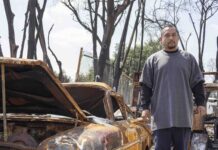Laura Gonzalez
The entire world was celebrating and 7,000 miles away, William Melendez thought about his family kissing and hugging in his hometown as “Auld Lang Syne” echoed in the streets of Los Angeles. Meanwhile, the base where he was camping with his unit in Iraq was being attacked.
The enemy often strikes on holidays and special occasions — they know how vulnerable the men in uniform can be.
William has already been deployed to Iraq two times. He was scheduled to leave again at the end of April, this time to Afghanistan. Although he is very proud to have served his country, he is tired and he can’t imagine fighting another war.
“The younger marines look forward to it,” he said. “The older ones, we just want to get it over with. We don’t look forward to it. We just want to leave and do our job. We have an idea of what’s coming. It’s not a pretty picture.”
Being in the military is considered one of the most reliable jobs in the country because it offers a secure paycheck, tax advantages, medical and dental insurance, and education benefits, among other things.
“The military now is a steady job,” William said. “You get a steady paycheck. You get pay every 1st and every 15th and because of the Iraqi war, President Bush every year gave military a pay raise.”
Since the start of the Iraq War in 2003, hundreds of thousands of military men and women have been deployed overseas.
Due to the current economic situation in the country military branches have recently seen an increase in enrollment. Although recruiters are always looking for people to sign, they wish people had other reasons to join.
“We like people to come in, but we don’t want people to come in just because the economy is down,” said Captain Robert Gump California National Guard. “We want them to come in because they have a sense of purpose to be in the military and because they’d like to serve the country.”
A few months ago, Pierce College approached Gump with a plan to enroll soldiers in fiber optic training to prepare them for jobs outside the military. The class was set to start in March, but was cancelled due to lack of funding. He is still trying to find a way for the soldiers to take the class without having to spend a lot of their own money.
“[The purpose of the classes is to] utilize the soldiers’ benefits to prepare them for the civilian world,” Captain Gump said.
Some of the funding for the class might come from their GI Bill benefits. After 9/11 the GI bill that gives education benefits to military members was modified. Some of the benefits include coverage of 100 percent of tuition and fees for members that have been in active duty for more than 36 months, a monthly housing allowance, and an early books and supplies stipend of up to $1,000.
Meanwhile, Michael Andalon, one of the privates who was hoping to take the class is looking for employment. He has realized that being part of the military is a setback when applying for a job.
“I think that other employers don’t want to risk employing a military person that can leave at any time,” said Andalon. “It becomes an issue getting a job once you are out.”
Andalon will be returning to active duty at the end of the month as a mechanic for the California National Guard and he is happy about it. Being a part of the military is like being part of a “great family.”
“You become a family. You grow accustomed to your unit members. It’s just like a big fraternity,” Andalon said.
For other soldiers, the military is merely a phase in their lives. William hopes to come back in eight months and continue with his studies. Since joining the marine reserves in 2002, he has been pulled out of school three times. He was taking classes at Pierce College before he was told of his next mission in Afghanistan.
William does not have the same problem that Andalon has. When he comes back from Afghanistan, he will not have to become a part of the more than 2 million unemployed individuals in California.
His boss at the Animal Medical Center of Southern California is enormously proud of him. William will have his job waiting for him when he comes back.
At the medical center, William works as a veterinary technician. His eyes light up when he talks about his job. His love for animals is palpable.
William was born in El Salvador but he and his parent moved to California when he was just a little boy.
One day, back in El Salvador, he was watching a documentary about animals where a veterinarian was being interviewed. The only thing that he recalls is that on the screen it said “veterinarian, doctor of animals.” At that moment he knew what he wanted to do for the rest of his life.
“William is my hero,” said Leland Shapiro, Ph.D., professor in the agricultural department at Pierce.
Shapiro’s father is a WWII veteran. Shapiro is a passionate supporter of the military. He ships boxes oversees containing licorice, magazines, wipes and non-perishable items to the troops whenever he can.
“As soon as I come back, I will finish up the courses with Dr. Shapiro and hopefully I’ll be going to veterinarian school after that,” William said.
As hopeful as he is about returning to his loved ones, William can’t help but wonder about his next mission. He knows exactly what to expect. Going for more than three weeks without a shower, a whole month without talking to his family and facing the possibility of death are moments that he is not looking forward to experiencing again.
“I have friends that are on active duty and they have been deployed year after year, after year, and they are tired of it. They want to be with their families,” William said.
Despite the risks and the emotional and psychological traumas that can occur to an individual after fighting in combat, in difficult economic times some people do not have any choice but to sign up.
The economic crisis is not likely to go away any time soon. A lot of people might have to think about alternative ways to make a living.
In the living room, dozens of family memories have been hung on the wall and placed delicately on top of furniture. William’s mom evokes his two tours with nostalgia.
“This is what he decided and I have to support and respect him, but in my heart,” Blanca Alicia Melendez said. “I wouldn’t want him to go.”
She knows what it will be like when he leaves: Worrying about him when weeks go by and she is not able to hear his voice, know if his stomach is full or if he is emotionally stable.
Her voice breaks up just talking about it.
It is also hard for his father. They both realize that this is something that William has to do and try to be strong.
Although William was told that he would return in eight months, nothing is for sure.
Sometimes military units go overseas and they might be ordered to prolong their mission.
“One thing I like to do is expect the worst,” William said. “So, that when it happens you are not surprised.”

(Jared Iorio)



